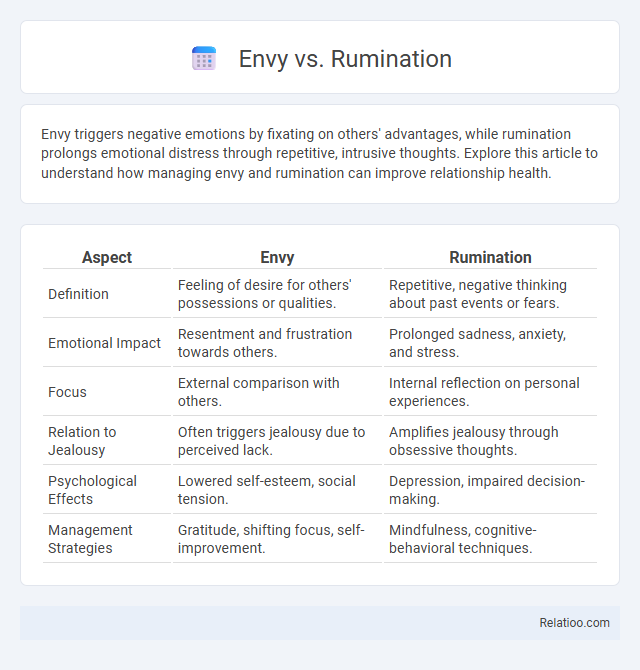Envy triggers negative emotions by fixating on others' advantages, while rumination prolongs emotional distress through repetitive, intrusive thoughts. Explore this article to understand how managing envy and rumination can improve relationship health.
Table of Comparison
| Aspect | Envy | Rumination |
|---|---|---|
| Definition | Feeling of desire for others' possessions or qualities. | Repetitive, negative thinking about past events or fears. |
| Emotional Impact | Resentment and frustration towards others. | Prolonged sadness, anxiety, and stress. |
| Focus | External comparison with others. | Internal reflection on personal experiences. |
| Relation to Jealousy | Often triggers jealousy due to perceived lack. | Amplifies jealousy through obsessive thoughts. |
| Psychological Effects | Lowered self-esteem, social tension. | Depression, impaired decision-making. |
| Management Strategies | Gratitude, shifting focus, self-improvement. | Mindfulness, cognitive-behavioral techniques. |
Understanding Envy: Definition and Origins
Envy is an emotional state arising from a perceived lack of another person's desirable qualities, possessions, or achievements, often linked to feelings of inferiority and resentment. Unlike rumination, which involves repetitive, intrusive thoughts usually focused on personal distress or past events, envy centers on social comparison and the desire to obtain what others have. Understanding envy requires examining its psychological roots in social comparison theory and evolutionary mechanisms that foster resource competition and self-assessment.
What is Rumination? Exploring the Concept
Rumination is a cognitive process involving repetitive and passive focus on negative emotions and distress, often linked to anxiety and depression. Unlike envy, which centers on desiring what others possess, rumination fixates inwardly on past events or perceived failures without productive resolution. Understanding rumination is crucial in psychology because it impedes emotional regulation and exacerbates mental health challenges.
Psychological Roots: Why We Experience Envy and Rumination
Envy and rumination both stem from deep-seated psychological roots linked to self-evaluation and emotional regulation. Envy arises when individuals perceive a discrepancy between their own status or possessions and those of others, triggering feelings of inferiority and desire. Rumination involves repetitive, negative thought patterns often rooted in unresolved emotional conflicts or stress, which exacerbate distress by reinforcing self-critical beliefs and preventing cognitive closure.
Key Differences Between Envy and Rumination
Envy involves feeling resentful or longing for what others possess, driven by social comparison and desire for their advantages. Rumination, in contrast, is a repetitive and passive focus on negative thoughts, often about past events or emotions, without resolution or problem-solving. Understanding these key differences helps you recognize that envy targets external possessions or qualities, while rumination fixates internally on distressing thoughts.
The Impact of Envy on Mental Health
Envy often triggers persistent negative thoughts, leading to rumination that intensifies feelings of inadequacy and stress. This cyclical pattern contributes to heightened anxiety, depression, and decreased overall mental well-being. Understanding the psychological mechanisms behind envy-induced rumination is crucial for developing effective interventions to improve mental health outcomes.
How Rumination Affects Emotional Wellbeing
Rumination, characterized by repetitive and passive focus on distressing thoughts, significantly harms emotional wellbeing by intensifying feelings of anxiety and depression. Unlike envy, which centers on others' advantages, rumination traps individuals in negative self-reflection, impairing cognitive functioning and prolonging emotional distress. This mental pattern disrupts mood regulation and reduces the capacity to engage in problem-solving, exacerbating psychological vulnerability over time.
Envy vs. Rumination: Signs and Symptoms
Envy manifests through feelings of resentment and longing for others' success or possessions, often accompanied by jealousy and decreased self-esteem. Rumination involves repetitive, intrusive thoughts that focus on distressing experiences or perceived failures, leading to heightened anxiety and depression. Unlike envy's outward comparison, rumination centers on inward cognitive loops, making symptoms such as obsessive worry and emotional exhaustion key differentiators.
Envy and Rumination in Social Settings
Envy and rumination often intertwine in social settings, where envy triggers persistent negative thoughts about others' advantages, intensifying emotional distress. Your tendency to ruminate can amplify feelings of inadequacy and social comparison, creating a cycle that undermines well-being and interpersonal relationships. Understanding the distinct roles of envy and rumination helps in developing strategies to break this cycle and foster healthier social interactions.
Strategies to Manage Envy and Break the Rumination Cycle
Effective strategies to manage envy and break the rumination cycle include practicing mindfulness meditation to increase present-moment awareness and reduce negative thought patterns associated with envy. Cognitive-behavioral techniques such as reframing negative thoughts about others' successes into opportunities for self-improvement help diminish envy's intensity. Engaging in gratitude journaling promotes a shift in focus from what is lacking to the abundance in one's own life, thereby interrupting repetitive rumination and fostering emotional resilience.
Cultivating Resilience: Moving Beyond Envy and Rumination
Cultivating resilience involves transforming the corrosive emotions of envy and rumination into constructive self-awareness and growth. Envy triggers comparisons that erode self-esteem, while rumination traps individuals in repetitive negative thought cycles that amplify stress and impede problem-solving. Developing mindfulness and adaptive coping strategies enhances emotional regulation, empowering individuals to reframe challenges and foster personal strength beyond envy and rumination.

Infographic: Envy vs Rumination
 relatioo.com
relatioo.com